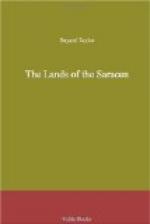After an hour’s halt, we started again. The sun was intensely hot, and for hours we jogged on over the dead level, the bare white soil blinding our eyes with its glare. The distant hills were lifted above the horizon by a mirage. Long sheets of blue water were spread along their bases, islanding the isolated peaks, and turning into ships and boats the black specks of camels far away. But the phenomena were by no means on so grand a scale as I had seen in the Nubian Desert. On the south-western horizon, we discerned the summits of the Karaman range of Taurus, covered with snow. In the middle of the afternoon, we saw a solitary tent upon the plain, from which an individual advanced to meet us. As he drew nearer, we noticed that he wore white Frank pantaloons, similar to the Turkish soldiery, with a jacket of brown cloth, and a heavy sabre. When he was within convenient speaking distance, he cried out: “Stop! why are you running away from me?” “What do you call running away?” rejoined Francois; “we are going on our journey.” “Where do you come from?” he then asked. “From there,” said Francois, pointing behind us “Where are you going?” “There!” and the provoking Greek simply pointed forwards. “You have neither faith nor religion!” said the man, indignantly; then, turning upon his heel, he strode back across the plain.
About four o’clock, we saw a long line of objects rising before us, but so distorted by the mirage that it was impossible to know what they were. After a while, however, we decided that they were houses interspersed with trees; but the trees proved to be stacks of hay and lentils, heaped on the flat roofs. This was Ismil, our halting-place. The houses were miserable mud huts; but the village was large, and, unlike most of those we have seen this side of Taurus, inhabited. The people are Turcomans, and their possessions appear to be almost entirely in their herds. Immense numbers of sheep and goats were pasturing on the plain. There were several wells in the place, provided with buckets attached to long swing-poles; the water was very cold, but brackish. Our tent was pitched on the plain, on a hard, gravelly strip of soil. A crowd of wild-haired Turcoman boys gathered in front, to stare at us, and the shepherds quarrelled at the wells, as to which should take his turn at watering his flocks. In the evening a handsome old Turk visited us, and, finding that we were bound to Constantinople, requested Francois to take a letter to his son, who was settled there.
Francois aroused us this morning before the dawn, as we had a journey of thirty-five miles before us. He was in a bad humor; for a man, whom he had requested to keep watch over his tent, while he went into the village, had stolen a fork and spoon. The old Turk, who had returned as soon as we were stirring, went out to hunt the thief, but did not succeed in finding him. The inhabitants of the village were up long before sunrise, and driving away in their




